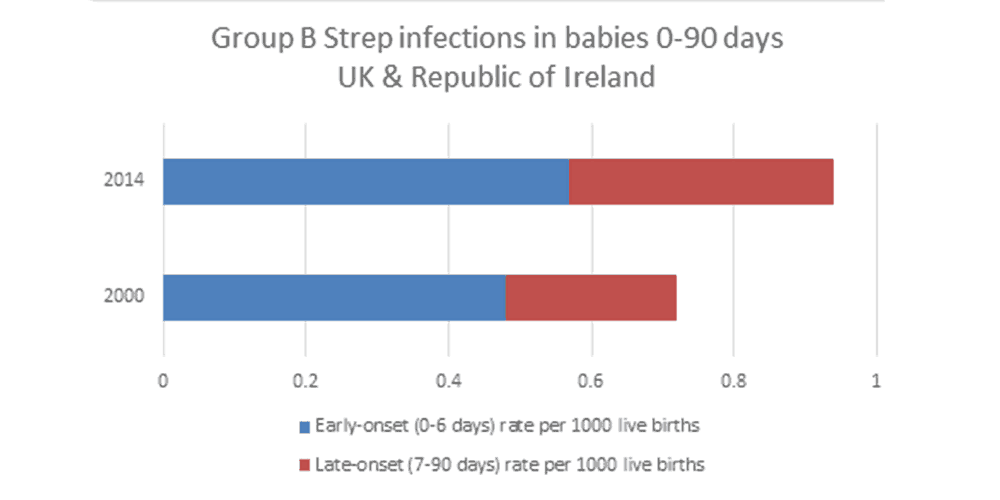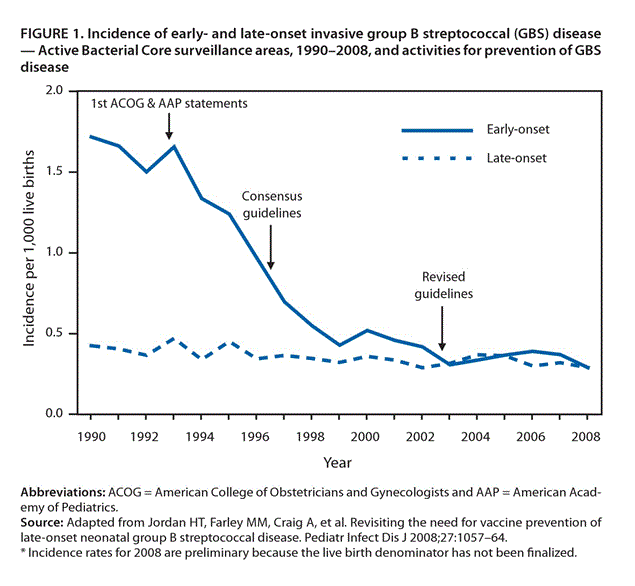Increasing incidence of group B Strep infections in babies in the UK and Republic of Ireland
The latest enhanced survey of the incidence of group B Strep infection reports a rise of 51% in the number of group B Strep infections in babies aged 0-90 days (and a 31% rise in the rate per 1,000 live births) in the UK and Republic of Ireland in the 13-month surveillance period during 2014-5 compared with 2000-1 (to 0.94 from 0.72 per 1,000 live births). You can read a summary of the 2014-5 study here, and a summary of the 2000-1 study here.
The number of babies who died from their group B Strep infection was no higher in 2014-5 than in 2000-1 (53), but more than twice as many survivors in 2014-5 were reported as having major, minor or possible disability at discharge (71) compared with 2000-1.
On average:
- 2 babies a day develop GBS infection
- 1 baby a week dies from GBS infection and
- 1 baby a week survives with long-term disability
The increases are particularly shocking since, in between these two extensive studies, in 2003 the Royal College of Obstetricians & Gynaecologists introduced their risk-based prevention guidelines. These guidelines had been expected to effect a fall in early-onset (0-6 days) GBS infections by 50-60%.

In the graph above, the potentially preventable early-onset group B Strep infections (in babies aged 0-6 days) are shown in the blue bar – the infections that the risk-based prevention strategy had been expected to reduce.
The rate of late-onset group B Strep infections (in babies aged 7-90 days), shown in the red bar, has also increased. Sadly, these late-onset GBS infections cannot currently be prevented.
In the future, a GBS vaccine will be developed to prevent most group B Strep infection – both early- and late-onset, as well as stillbirths and maternal infections – but this is still many years away. More needs to be done now to prevent GBS infections in newborn babies.
In countries that routinely screen pregnant women for group B Strep, such as the United States, the incidence has fallen dramatically since the introduction of prevention strategies:
As the graph above shows, intravenous antibiotics given in labour against group B Strep infection have been highly effective at reducing the incidence of early-onset group B Strep infection, but have had no impact on late-onset group B Strep infection. The rate of early-onset GBS infections in the US has fallen still further after 2008. For 2016, the US national estimated rate for early-onset GBS infection was 0.22 per 1,000 live births and for late-onset 0.25 (click here). For 2014-5 in the UK and Republic of Ireland, the rates were 0.57 for early-onset and 0.37 for late-onset per 1,000 live births respectively.
For the data series published by the UK Health Security Agency and its predecessors on the incidence of GBS bacteraemia (GBS detected from the blood) from 2001 onwards, please see below:
Laboratory surveillance of pyogenic and non-pyrogenic streptococcal bacteraemia in England: 2022 update UK Health Security Agency. Health Protection Report Volume 17 Number 14 21 November 2023
Laboratory surveillance of pyogenic and non-pyogenic streptococcal bacteraemia in England: 2021 update UK Health Security Agency. Health Protection Report Volume 16 Number 13 30 December 2022
Laboratory surveillance of pyogenic and non-pyogenic streptococcal bacteraemia in England: 2020 update UK Health Security Agency. Health Protection Report Volume 15 Number 19 23 November 2021
Laboratory surveillance of pyogenic and non-pyrogenic streptococcal bacteraemia in England: 2019 Public Health England (serial online) Health Protection Report. 14(24): Bacteraemia.
Laboratory surveillance of pyogenic and non-pyogenic streptococcal bacteraemia in England, Wales and Northern Ireland: 2018: Public Health England (serial online) Health Protection Report. 13(41): Bacteraemia.
Voluntary surveillance of pyogenic and non-pyogenic streptococcal bacteraemia in England, Wales and Northern Ireland: 2016: Public Health England (serial online) Health Protection Report. 11(41): Bacteraemia.
Voluntary surveillance of pyogenic and non-pyogenic streptococcal bacteraemia in England, Wales and Northern Ireland: 2015: Public Health England (serial online) Health Protection Report. 10(41): Bacteraemia.
Pyogenic and non-pyogenic streptococcal bacteraemia (EWNI, 2014): Public Health England (serial online) 2015 Health Protection Report. 9(41): Bacteraemia.
Pyogenic and non-pyogenic streptococcal bacteraemia (EWNI, 2013): Public Health England (serial online) 2014 Health Protection Report. 8(44): Bacteraemia
Voluntary surveillance of pyogenic and non-pyogenic streptococcal bacteraemia in England, Wales and Northern Ireland: 2012 Public Health England (serial online) 2013 Health Protection Report. 7(46): Bacteraemia
Pyogenic and non-pyogenic streptococcal bacteraemia, England, Wales and Northern Ireland: 2011 Health Protection Report [serial online] 2012; 6(46): Bacteraemia
Pyogenic and non-pyogenic streptococcal bacteraemia, England, Wales and Northern Ireland: 2010 Health Protection Report [serial online] 2011; 5(46): Bacteraemia
Pyogenic and non-pyogenic streptococcal bacteraemia, England, Wales and Northern Ireland:2009 Health Protection Report [serial online] 2010;4(46):bacteraemia.
Pyogenic and non-pyogenic streptococcal bacteraemias, England, Wales and Northern Ireland: 2008 November 2009;3(49):bacteraemia
Pyogenic and non-pyogenic Streptococcal bacteraemia, England, Wales & Northern Ireland: 2007 2008 November. HPR Vol 2 No 47.
Pyogenic and non-pyogenic Streptococcal bacteraemia, England, Wales & Northern Ireland: 2006 2007 November. HPR Vol 1 No 45.
Pyogenic and non-pyogenic streptococcal bacteraemia, England, Wales and Northern Ireland: 2005. Commun Dis Rep Wkly [serial online] 2006;16(46): Bacteraemia,
Pyogenic and non-pyogenic streptococcal bacteraemia, England, Wales and Northern Ireland: 2004. Commun Dis Rep Wkly [serial online] 2005;15(24): Bacteraemia
Pyogenic and non-pyogenic streptococcal bacteraemia, England, Wales and Northern Ireland: 2003. Commun Dis Rep Wkly [serial online] 2004; 13(16): Bacteraemia
Pyogenic and non-pyogenic streptococcal bacteraemia, England, Wales and Northern Ireland: 2002. Commun Dis Rep Wkly [serial online] 2003; 13(16): Bacteraemia
Pyogenic and non-pyogenic streptococcal bacteraemia, England and Wales, 2001. Commun Dis Rep Wkly [serial online] 2002; 12(16): Bacteraemia







